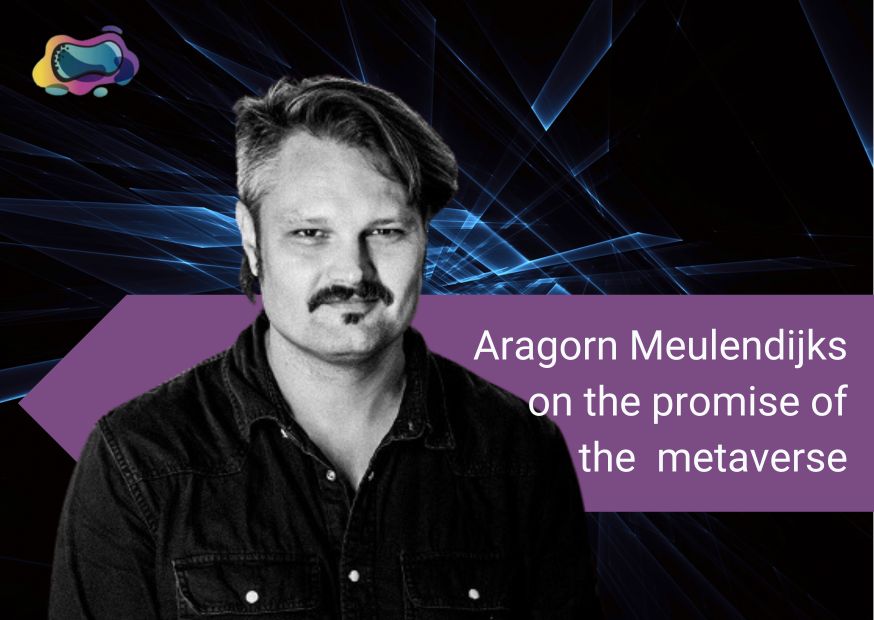The metaverse is a world in which our virtual and physical world seamlessly merge. That means that the internet will become as 3D as the rest of our life, says Aragorn Meulendijks, futurist and keynote speaker about the metaverse. Nevertheless, investors are withdrawing more from the market after a large initial influx of investments in 2022: “We are now in the trough of disillusionment, so that also makes sense.”
In recent weeks, the news has been dominated by rounds of layoffs and declining investments. But according to Aragorn Meulendijks, futurist and keynote speaker on the future and the metaverse, this is a normal development: “The fact is that capitalist thinking, which has become very strong in the past fifty years, is grafted on profit generation. That profit point must be on a horizon that is within reach. We are not planning ahead for the next generation.”
Less confidence in the economy
“But besides the fact that investors still want to enjoy their investments within their lifetime, they are of course strongly influenced by the economic climate of the moment. We are now in a bear market, in which investors have less confidence in the economy. That is reflected in the investments they make and therefore also impacts the investments on the metaverse initiatives.”
The development is actually quite normal, says Meulendijks: “Do you know the Gartner hype cycle? It is a model that has been used since the 1990s to predict the development of new technology. First there is a peak of interest and then the trough of disillusionment, after which interest and investment pick up again and the technology becomes more mainstream. The metaverse is in that valley.”
Land ownership in the metaverse is illogical
According to Meulendijks, this development can only be a good thing: “If a technology is very popular, a lot of money is wasted. We have certainly seen that in the past two years. For example, by selling virtual land. But there is no limit on how much digital land is available, so it just doesn’t make a lot of sense.”
But what is the metaverse, according to Meulendijks? “It is an understanding and concept that is still in flux. Although the term goes back longer, it became popular in 2022. For me it is a catchall term for everything that is happening now in that knee of the exponential growth of technology. I believe we are moving towards a point where we supplement our biological human thinking with artificial intelligence and the speed of modern processors, which are already millions of times faster than the human brain.”
A new phase of our evolution
“We are entering a new phase of our evolution. We are moving from a completely organic evolution to a partly mechanical or even digital evolution. As far as I’m concerned, the metaverse is the first very clear phase after the emergence of the internet. It is an umbrella term for all technologies that contribute to a more frictionless integration of our digital existence with our physical existence.”
What does it mean to have a frictionless integration between our physical and digital lives? “We are going to live more in the digital world or that our world has more digital aspects that we can no longer distinguish from physical aspects. Then you immediately start thinking about senses. The sound of your telephone, for example, already mixes those two worlds. But there is still a clear transition there, because you stop what you are doing in physical life and switch to digital life. Those two dimensions do not yet merge seamlessly.”
The internet is 2D, but that’s not natural
“Or look at it this way: the internet has mainly been 2D so far. And that while we have evolved millions of years to have three-dimensional interactions in a three-dimensional world. The metaverse is the promise of technology coming together to make the transition between physical and digital simpler, even frictionless.” But the technical realization of this frictionless world is only one of the challenges we face.
Meulendijks: “We currently have little or no regulation and actually no relevant enforcement or infrastructure for this in the digital domain, for example around ownership. And that while ownership is everywhere in physical society. This is my house and another human being is not allowed to enter just like that. In the digital world, this is not yet the case at all. That is why the development of web3, for example, is so important, regardless of whether blockchain is the way to arrange it.”
Maintain and keep order
It would also be nice if not everything has to go through a third party, such as a bank. “You can also exchange cash or give something in real life. These are basic needs or basic conditions of a functioning society.” Finally, the question is: how are we going to enforce all of this? “Keeping up to date and keeping order takes a huge amount of manpower. That is one of the biggest challenges. Not generating and building those worlds.”
Why is generating and building a virtual world not a challenge? “Because generative AI is going to build those worlds for us. That’s why AI is an important part of that whole metaverse development. Where it develops like the internet: computers, telephony wiring and software have come together to make the internet. For example, we now see the convergence of 3D real-time technology, 6G, Web3, augmented reality and artificial intelligence leading to the metaverse.”
This is the second interview in the series about the metaverse. You can find the first interview with Remco Sikkema here.

